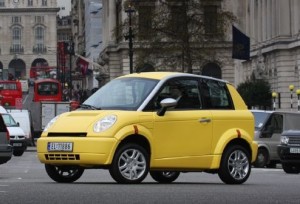
Th!nk City Car could use a charge
Like so many other green-minded automotive wannabes, the Norwegian-based Think Global saw a silver lining in the record fuel prices that hung, like a storm cloud, over the rest of the auto industry, in early 2008.
After years of trying to find a niche in the market – including a several-year run under the ownership of Ford Motor Co. – the electric vehicle maker was ambitiously laying out plans to ramp up production of its $30,000 Th!nk city car to 10,000 units a year. And why not? Other new, fuel-efficient entries, such as the BMW Mini and Daimler AG’s Smart fortwo, as well as Toyota’s Prius hybrid, were scoring huge sales, even as demand for most other vehicles began to plummet.
But the volatility of fuel prices, as well as the global automotive market has caught up with Think Global. The unexpected reversal in petroleum costs has seen an upsurge in sales of traditional light trucks, and the collapse in demand for high-mileage models; Prius sales barely topped 6,000, last month, off from a more than 20,000 peak in April ’08.
With lenders thinking twice, partsmakers demanding pay – and the Norwegian government refusing to offer financial assistance, Think has gone into bankruptcy.
The small firm still has some hopes, after securing a $5.7 million loan from the company that was providing its lithium-ion batteries, Ener1 Group, but unless it can line up still more funding, its factory and 300 workers will remain idled.
“It doesn’t seem right that the traditional auto companies are getting massive public money to stave off their decline, while newcomers in the electric car space are being starved of capital,” complained Think Chief Executive Richard Canny, in the Wall Street Journal.
The downturn in demand for high-mileage vehicles may be temporary, however. At least that’s what most of the world’s major automakers, and a number of other green auto start-ups are counting on. Both General Motors and Toyota, for example, are forecasting a return to triple-digit oil prices once the global economy picks back up. Both makers, as well as Ford and others, are moving aggressively on their own “electrification” programs. And new entries, such as China’s BYD and California-based Fisker Automotive, are also in the rapid development phase.
Think has shown an ability to survive setbacks, including Ford’s decision to sell the company off after initially hailing it as the future of the automobile. But whether the Norwegian maker can find enough money to charge back into the market anytime soon is uncertain.

I think that the fact that a Think costs $30K and is only about the size of a Smart probably explains why the company is circling the drain.
It definitely doesn’t help, though it may take the public some time to recognize that the basic economics of the cars we’ve known will change when EVs and plug-ins reach market in any real volume. In a sense, you’re front-loading some of your costs. Batteries are expensive, up front, but the electricity to charge them is cheap. On an apples-to-apples basis, if gas climbed back to the $3+ range, as most expect, you might wind up spending $0.20 or more/mile for fuel. But the battery car might cost $0.02-$0.03. Drive the average 15,000 miles/year, and you’d run up a $3000 gas bill or a $300 electric bill. Over a 5-year ownership cycle, the savings would approach $14,000. (And most makers expect to warrant the batteries for at least 100,000 miles.)
Now, work in the tax incentives currently or likely to be offered, and suddenly, an EV or PHEV could start making economic sense.
Paul A. Eisenstein
Publisher, TheDetroitBureau.com
All very good points. It’s hard for the average Joe to do any kind of apples to apples comparison with this car. I mean what other pure electric is there currently (no pun intended) to compare it to? GM never sold the EV1 and the Tesla is a vastly different car even if they are both two seaters. You can’t really compare it to a hybrid like the Prius. The reason I singled out the Smart is that, disregarding the power source, it’s a relatively similar car. I currently own a Honda Element but I would love to be able to buy some kind of pure electric for commuting and short trips around town.
By the way, belated kudos on this site. I hope you get more people making comments. I’ve always been interested in cars and the car business and would like to have intelligent conversations with others about their future directions.
Thanks for the kind words…and your thoughts, Bryan. Your point is well taken,
Meanwhile, please help spread the word about TheDetroitBureau.com, and feel free to offer your comments on some of the other topics on the site. From past experience, I know it takes time — and the help of a few folks, like yourself — to get the conversation going and growing.
Paul A. Eisenstein
Bureau Chief, TheDetroitBureau.com